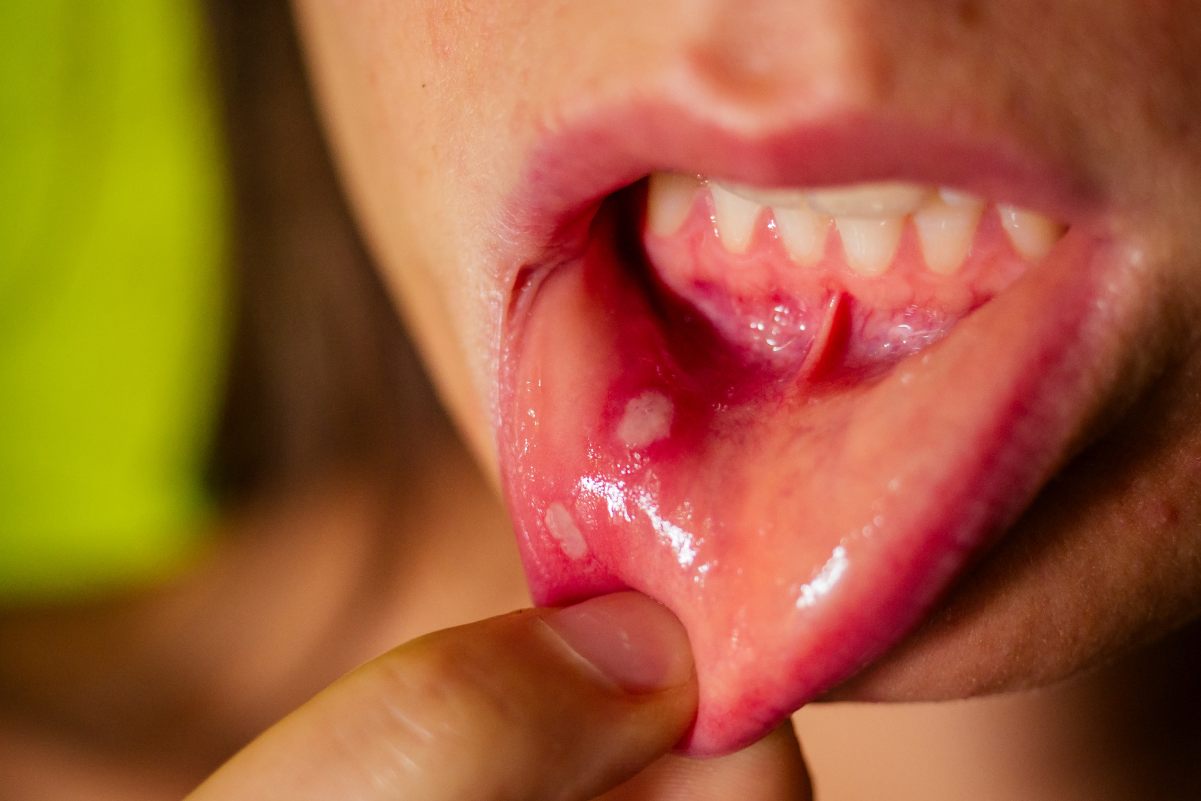If you’ve ever had a canker sore, you know just how annoying and painful they can be- it’s hard to think about anything else when you have one! Also called aphthous ulcers, canker sores are the most common cause of repeated sores inside the mouth or on the genital area. These pesky recurring ulcers are more common in women and usually start showing up in childhood or teen years. While the cause of canker sores remains unknown, there are things you can do to make them more bearable when they show up, and maybe even some ways to lower the likelihood of triggering them!
Identify your issue
Did you know there are different kinds of canker sores? There are 3 types. All of them have a round, oval shape and a grayish white or yellowish base surrounded by a red ring. Here’s the breakdown:
-
Minor aphthae (80% of cases): This is the most common type of canker sore. This type tends to be more shallow and only mildly painful. They are also smaller, generally 1 cm or less in diameter. Minor aphthae last 1-2 weeks and don’t leave behind scars once they heal.
-
Major aphthae (10% of cases): This more rare type causes sores that are generally larger (2 cm or greater in diameter), deeper, and significantly more painful than minor aphthae. They also last longer, about 2-4 weeks, and can cause scarring.
-
Herpetiform aphthae (10% of cases): Also not as common, in this presentation there are multiple sores that develop, lasting 1-4 weeks, and generally don’t leave behind scars.
Common triggers
Again, the cause for canker sores is not known. But, there are many triggers that can potentially set them off or make them worse:
-
Stress
-
Lack of sleep
-
Trauma (biting, bumping, etc)
-
Vitamin deficiencies
-
Toothpastes with sodium lauryl sulfate
-
Acidic foods
-
Medical conditions (anemia, inflammatory bowel disease, weakened immune system)
Helpful treatments
While there is no cure for a canker sore, there are ways you can help relieve the pain while you’re waiting for it to heal over the next few weeks.
-
Avoid triggers- reduce stress, get adequate sleep, avoid trauma to the affected area, and avoid acidic foods and beverages
-
Over-the-counter topical treatments - protective barrier paste (Orabase) and/or local numbing medications (benzocaine or lidocaine)
-
Prescription treatments- for non-healing, frequent, or extremely uncomfortable canker sores, a medical professional should be consulted, as they may be able to offer additional treatment options, like:
-
Medicated mouth rinses
-
Topical steroid pastes or ointments
-
An anti-inflammatory antibiotic dissolved in water to swish in the mouth
-
In the most severe cases, oral steroids or medications like dapsone or colchicine
Prevention tips
While canker sores cannot always be avoided, here are some helpful ways you can try to prevent them as best as you can:
-
Prioritize your health: Consult with your primary care clinician if you need to be evaluated for any medical conditions like anemia or or vitamin deficiency, and treat as directed. Eat a healthy diet, avoiding acidic foods when you have an active canker sore. Find ways to manage day-to-day stress in a healthy way. And make sure you’re getting adequate sleep!
-
Dental care suggestions: Use a toothpaste that is free of sodium lauryl sulfate. Consider using an antibacterial mouthwash that contains chlorhexidine. These steps may help decrease the frequency of canker sore recurrences. Consult your dentist for tailored recommendations.
Looking for help?
If you have canker sores that are slow to heal, happen on a frequent basis, or have way too much discomfort with them, it’s time to get a professional opinion. You can always feel free to ask one of our dermatology providers, and if it’s beyond their scope for management, they’ll be happy to point you in the direction of a provider who should be able to help.
Book an appointment with one of our dermatology providers if you have more questions about canker sores, or for additional skin care needs!





